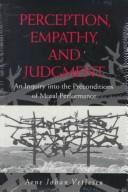| Listing 1 - 8 of 8 |
Sort by
|

ISBN: 0271010568 9780271010564 0271010126 9780271010120 Year: 1994 Publisher: Philadelphia (Pa.): Pennsylvania State university press
Abstract | Keywords | Export | Availability | Bookmark
 Loading...
Loading...Choose an application
- Reference Manager
- EndNote
- RefWorks (Direct export to RefWorks)
Judgment (Ethics) --- Empathy. --- Empathie. --- Ethiek. --- Ethik. --- Judgment (Ethics). --- Empathy --- Moral judgment --- Ethics --- Attitude (Psychology) --- Caring --- Emotions --- Social psychology --- Sympathy

ISBN: 0521673577 0521856949 9780521673570 9780521856942 9780511610776 0511137729 9780511137723 0511135556 9780511135552 0511610777 1107155886 9781107155886 1280431911 9781280431913 0511183798 9780511183799 0511201915 9780511201912 0511312032 9780511312038 Year: 2005 Publisher: Cambridge, UK New York Cambridge University Press
Abstract | Keywords | Export | Availability | Bookmark
 Loading...
Loading...Choose an application
- Reference Manager
- EndNote
- RefWorks (Direct export to RefWorks)
Evil is a poorly understood phenomenon. In this provocative 2005 book, Professor Vetlesen argues that to do evil is to intentionally inflict pain on another human being, against his or her will, and causing serious and foreseeable harm. Vetlesen investigates why and in what sort of circumstances such a desire arises, and how it is channeled, or exploited, into collective evildoing. He argues that such evildoing, pitting whole groups against each other, springs from a combination of character, situation, and social structure. By combining a philosophical approach inspired by Hannah Arendt, a psychological approach inspired by C. Fred Alford and a sociological approach inspired by Zygmunt Bauman, and bringing these to bear on the Holocaust and ethnic cleansing in the former Yugoslavia, Vetlesen shows how closely perpetrators, victims, and bystanders interact, and how aspects of human agency are recognized, denied, and projected by different agents.
Collective behavior --- Good and evil --- #SBIB:327.5H20 --- 316.647:3 --- Evil --- Wickedness --- Ethics --- Philosophy --- Polarity --- Religious thought --- Behavior, Collective --- Crowd behavior --- Crowds --- Mass behavior --- Human behavior --- Social action --- Social psychology --- Vredesonderzoek: algemeen --- Agression. Violence (psychologie sociale) --- Psychology --- Good and evil. --- Collective behavior. --- Social Sciences --- Sociology
Book
ISBN: 1003317693 1000736008 1003317693 1032330015 1032330023 Year: 2022 Publisher: Milton Taylor & Francis Group
Abstract | Keywords | Export | Availability | Bookmark
 Loading...
Loading...Choose an application
- Reference Manager
- EndNote
- RefWorks (Direct export to RefWorks)
Book
ISBN: 9781861895417 Year: 2009 Publisher: London Reaktion
Abstract | Keywords | Export | Availability | Bookmark
 Loading...
Loading...Choose an application
- Reference Manager
- EndNote
- RefWorks (Direct export to RefWorks)
Book
ISBN: 0271071796 Year: 1994 Publisher: University Park, Pennsylvania : Pennsylvania State University Press,
Abstract | Keywords | Export | Availability | Bookmark
 Loading...
Loading...Choose an application
- Reference Manager
- EndNote
- RefWorks (Direct export to RefWorks)
In Perception, Empathy, and Judgment Arne Johan Vetlesen focuses on the indispensable role of emotion, especially the faculty of empathy, in morality. He contends that moral conduct is severely threatened once empathy is prevented from taking part in an interplay with cognitive faculties (such as abstraction or imagination) in acts of moral perception and judgment. Drawing on developmental psychology, especially British ";object relations"; theory, to illuminate the nature and functioning of empathy, Vetlesen shows how moral performance is constituted by a sequence involving perception, judgment, and action, with an interplay between the agent's emotional (empathic) and cognitive faculties occurring at each stage. In the powerful tradition from Kant to present-day theorists such as Kohlberg, Rawls, and Habermas, reason is privileged over feeling and judgment over perception, in such a way that basic philosophical questions remain unasked. Vetlesen focuses our attention on these questions and challenges the long-standing assertion that emotions are damaging to moral response. In the final chapter he relates his argument to recent feminist critiques that have also castigated moral theorists in the Kantian tradition for their refusal to recognize a role for emotion in morality. While the book's argument is philosophical, its method and scope are interdisciplinary. In addition to critiques of such philosophers as Arendt, MacIntyre, and Habermas, it contains discussions of specific historical, ideological, and sociological factors that may cause ";numbing";—selective or broad-ranging, pathological insensitivity—in humans. The Nazis' mass killing of Jews is studied to illuminate these and other relevant empirical aspects of large-scale immoral action.
Book
ISBN: 9780271071794 Year: 2021 Publisher: University Park, PA
Abstract | Keywords | Export | Availability | Bookmark
 Loading...
Loading...Choose an application
- Reference Manager
- EndNote
- RefWorks (Direct export to RefWorks)
Book
ISBN: 9781000736045 Year: 2023 Publisher: London Routledge, Taylor & Francis Group
Abstract | Keywords | Export | Availability | Bookmark
 Loading...
Loading...Choose an application
- Reference Manager
- EndNote
- RefWorks (Direct export to RefWorks)
Book
ISBN: 8200225631 Year: 1997 Publisher: Oslo Scandinavian university press
Abstract | Keywords | Export | Availability | Bookmark
 Loading...
Loading...Choose an application
- Reference Manager
- EndNote
- RefWorks (Direct export to RefWorks)
| Listing 1 - 8 of 8 |
Sort by
|

 Search
Search Feedback
Feedback About UniCat
About UniCat  Help
Help News
News